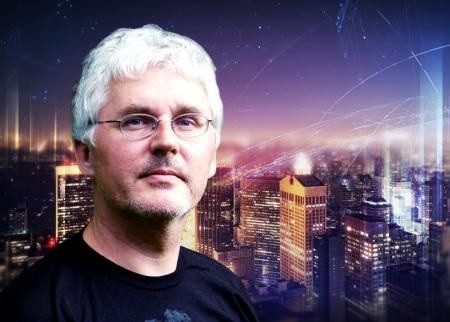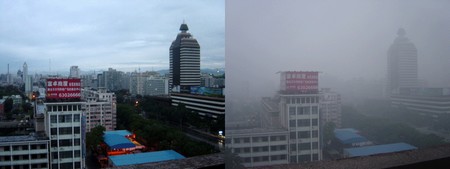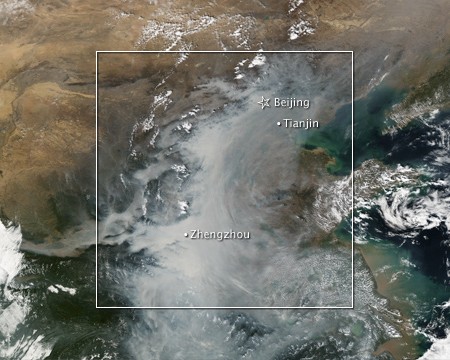Modelling an inconvenient truth about carbon footprints
In his latest paper, Klaus Hubacek describes how Chinese cities export their pollution to neighbouring regions. Previous papers discussed how our consumption choices and lifestyles can be linked to pollution and to environmental and health impacts around the globe. His work combines economics and environmental science into models that show the global consequences of regional policies. In March of this year, he became a full Professor at the Faculty of Science and Engineering, where he will be the director of the Center for Energy and Environmental Sciences (IVEM) and the Science and Society group.
With his degree in Economics and Business Administration, Klaus Hubacek looks like the odd one out in the Faculty of Science and Engineering. But economics is important in the study of climate change mitigation. ‘So far, the reports of the Intergovernmental Panel on Climate Change, the IPCC, were dominated by natural scientists. But the next report will have a stronger contribution from social sciences and economics,’ he explains in his new office in the Energy Academy Building. Hubacek will be one of the authors of the 6th report, which is due to appear in 2022.

Carbon
‘My belief is that we must overcome the biases from separate fields.’ As an economist, Austrian-born Klaus Hubacek obtained a PhD in Ecological Economics at Rensselaer Polytechnic Institute in the US. He has worked in Austria, the UK, the US and China and is now winding down his professorship at the University of Maryland (US) and starting his work in Groningen, which will be full-time by the start of the next academic year.
His work, he explains, is to create models that show how effective programmes to reduce carbon emissions and other pollutants are. Decarbonization of the economy is an important study object to him, but land degradation and air pollution are also on the agenda. ‘A lot of what I have done is developing models for stakeholders together with those stakeholders.’
Coastline
As an example, Hubacek mentions a project on coastal degradation, which he carried out in the US for shoreline communities. ‘Our models show how actions to prevent degradation will impact the entire system.’ For example, concrete blocks can protect part of the coastline, but the wave energy will only be deflected sideways. ‘This means that your neighbour gets more erosion, and social inequality and fairness enter the picture.’

His latest paper describes a similar problem in China. ‘In this case, the stakeholders were local authorities in Chinese provinces.’ The paper, which was published by the journal Science Advances on 24 April, shows how several more affluent regions, like the Beijing area, have issued stricter environmental laws to bring down air pollution, especially small particulate matter. ‘The main polluters were coal-fired power plants and heavy industry. Therefore, to reduce emissions, these local authorities had the glorious idea to outsource both energy production and heavy industry to regions with less strict environmental laws.’
Fun fact
This meant that the pollution was not prevented, it just moved to poorer regions. ‘A fun fact that we noticed in our models is that some of these areas were upwind of the richer regions, so part of the pollution was blown right back to them.’ He is curious what response the paper, written with Chinese co-authors, will get from local authorities. ‘A previous paper on these issues got me some very angry comments.’
Before we start tut-tutting those Chinese regions, Hubacek has published similar results for Western countries. ‘The UK was one of the few countries that achieved their pledges on reducing carbon emission in the Kyoto protocol. But if you look at the data, this was mostly done by outsourcing production to China.’

Models describing the climate impact of countries should not be limited to their national carbon footprint, argues Hubacek. ‘If you buy a toothbrush that is produced in China, the carbon emission of the entire supply chain should go to you as the consumer.’ But up until the 5th IPCC report, only territorial emissions were reported, not ‘consumer-based emissions’. ‘In the next report, that will change’, says Hubacek. And there will be consequences, also for The Netherlands. ‘Take the agricultural trade. This is based on global supply chains.’ Flowers traded in the Netherlands are often grown in African countries. ‘This land cannot be used now to feed local populations, and one needs to look carefully at who gains and benefits along global supply chains.’
Inconvenient truths
There are other inconvenient truths emerging from Hubacek’s models. The reduction in carbon emissions in the US during the Obama presidency? ‘Solar energy played an important role, but so did the economic recession. And natural gas from fracking replaced coal, which reduced emissions, but the coal was then dumped in Europe and burned here, so there was little global effect.’
And another sobering thought: there is a huge global carbon inequality. Income does predict your carbon footprint. ‘If the UN aims to reduce poverty are achieved, that will increase the global carbon emission quite substantially.’ If extreme poverty is eradicated and all people will earn at least 2 dollars a day, global carbon emissions will increase by 2.8 percent. But add another dollar to the daily income and the increase will be 27 percent. ‘But the problem is really with higher incomes, where the top 10 percent of income earners contribute close to 40 percent of global carbon emissions, whereas at the other end of the global income spectrum, the poorest 10 percent contribute just a couple of percent’.

‘We will have to look at the carbon intensity of lifestyles,’ says Hubacek. Even the greenest Westerner will have a relatively large carbon footprint. ‘But there are many tools to influence consumer life styles.’ The numbers Hubacek produces are no reason for optimism. ‘I try to buy fair trade chocolate and coffee, but my meat consumption and my car do produce a lot of emissions.’ You can only get so far with lifestyle choices. ‘Even electric cars are depending on the available energy mix – which to a large extent relies on coal in the Netherlands.’
Dog
Over the coming years, he will be producing his models and his papers at the University of Groningen. So, what is his plan? ‘I focus on cutting-edge and emerging issues related to human-environment interactions but I am not fixated on a specific research question or using a certain tool. I’m involved in different projects and I will be looking at what my colleagues here are doing.’ Hubacek expects that new projects will involve the side effects of carbon mitigation policies, such as land grabbing or land degradation. ‘I might do some more on that. And some more work on carbon footprints and lifestyle. Did you know that in the US, the amount of money spent on the average dog is higher than the average income in Egypt?’
Reference: Delin Fang, Bin Chen, Klaus Hubacek, Ruijing Ni, Lulu Chen, Kuishuang Feng, and Jintai Lin: Clean air for some: Unintended spillover effects of regional air pollution policies. Science Advances 24 April DOI 10.1126/sciadv.aav4707
| Last modified: | 02 May 2019 10.10 a.m. |
More news
-
10 June 2024
Swarming around a skyscraper
Every two weeks, UG Makers puts the spotlight on a researcher who has created something tangible, ranging from homemade measuring equipment for academic research to small or larger products that can change our daily lives. That is how UG...
-
21 May 2024
Results of 2024 University elections
The votes have been counted and the results of the University elections are in!

